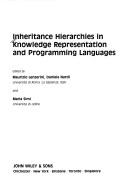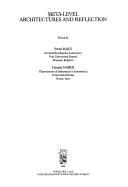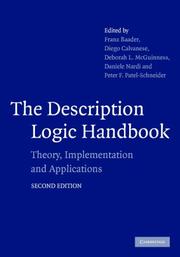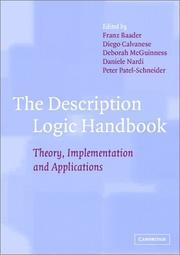| Listing 1 - 10 of 10 |
Sort by
|

ISBN: 0471927414 9780471927419 Year: 1991 Publisher: Chichester Wiley
Abstract | Keywords | Export | Availability | Bookmark
 Loading...
Loading...Choose an application
- Reference Manager
- EndNote
- RefWorks (Direct export to RefWorks)
Artificial intelligence. Robotics. Simulation. Graphics --- Expert systems (Computer science) --- Expertsystemen (Informatica) --- Kennisrepresentatie (Informatietheorie) --- Knowledge representation (Information theory) --- Langages de programmation (Ordinateurs) --- Programmeertalen (Computers) --- Programming languages (Electronic computers) --- Représentation des connaissances (Théorie de l'information) --- Systèmes experts (Informatique) --- Programming languages (Electronic computers)) --- Computer languages --- Computer program languages --- Computer programming languages --- Machine language --- Electronic data processing --- Languages, Artificial --- Representation of knowledge (Information theory) --- Artificial intelligence --- Information theory --- Knowledge-based systems (Computer science) --- Systems, Expert (Computer science) --- Computer systems --- Soft computing

ISBN: 0444703438 9780444703439 Year: 1988 Publisher: Amsterdam North-Holland
Abstract | Keywords | Export | Availability | Bookmark
 Loading...
Loading...Choose an application
- Reference Manager
- EndNote
- RefWorks (Direct export to RefWorks)
Artificial intelligence. --- Expert systems (Computer science). --- AI(Artificial intelligence) --- Intelligence [Artificial ] --- Langages de programmation (Ordinateurs) --- Programmeertalen (Computers) --- Thinking [Artificial ] --- Languages, Artificial --- Knowledge representation formalisms and methods: frames and scripts; predicate logic; relation systems; representation languages; procedural and rule-based representations; semantic networks (Artificial intelligence) --- 681.3*I24 Knowledge representation formalisms and methods: frames and scripts; predicate logic; relation systems; representation languages; procedural and rule-based representations; semantic networks (Artificial intelligence) --- Cerveaux électroniques --- Machines intelligentes --- Pensée artificielle --- Artificial intelligence --- Expert systems (Computer science) --- Programming languages (Electronic computers) --- 681.3*I24 --- 681.3 --- Computer languages --- Computer program languages --- Computer programming languages --- Machine language --- Electronic data processing --- Knowledge-based systems (Computer science) --- Systems, Expert (Computer science) --- Computer systems --- Soft computing --- AI (Artificial intelligence) --- Artificial thinking --- Electronic brains --- Intellectronics --- Intelligence, Artificial --- Intelligent machines --- Machine intelligence --- Thinking, Artificial --- Bionics --- Cognitive science --- Digital computer simulation --- Logic machines --- Machine theory --- Self-organizing systems --- Simulation methods --- Fifth generation computers --- Neural computers --- Computerwetenschap --- Artificial intelligence. Robotics. Simulation. Graphics --- 681.3* / / / / / / / / / / / / / / / / / / / / / / / / / / / / --- Expert systems (computers science)
Book
Year: 2005 Publisher: Berlin ; New York : Springer,
Abstract | Keywords | Export | Availability | Bookmark
 Loading...
Loading...Choose an application
- Reference Manager
- EndNote
- RefWorks (Direct export to RefWorks)
ThesearetheproceedingsoftheRoboCup2004Symposium,heldattheInstituto Superior T´ ecnico, in Lisbon, Portugal in conjunction with the RoboCup c- petition. The papers presented here document the many innovations in robotics that result from RoboCup. A problem in any branch of science or engineering is how to devise tests that can provide objective comparisons between alt- native methods. In recent years, competitive engineering challenges have been established to motivate researchers to tackle di?cult problems while providing a framework for the comparison of results. RoboCup was one of the ?rst such competitions and has been a model for the organization of challenges foll- ing sound scienti?c principles. In addition to the competition, the associated symposium provides a forum for researchers to present refereed papers. But, for RoboCup, the symposium has the greater goal of encouraging the exchange of ideas between teams so that the competition, as a whole, progresses from year to year and strengthens its contribution to robotics. One hundred and eighteen papers were submitted to the Symposium. Each paper was reviewed by at least two international referees; 30 papers were - cepted for presentation at the Symposium as full papers and a further 38 were accepted for poster presentation. The quality of the Symposium could not be maintained without the support of the authors and the generous assistance of the referees.
Artificial intelligence. --- Computer communication systems. --- Software engineering. --- User interfaces (Computer systems). --- Optical data processing. --- Control engineering. --- Robotics. --- Mechatronics. --- Artificial Intelligence. --- Computer Communication Networks. --- Software Engineering. --- User Interfaces and Human Computer Interaction. --- Image Processing and Computer Vision. --- Control, Robotics, Mechatronics. --- RoboCup --- Robotics --- Artificial intelligence --- Soccer --- Computer simulation
Book
Year: 2005 Publisher: Berlin ; New York : Springer,
Abstract | Keywords | Export | Availability | Bookmark
 Loading...
Loading...Choose an application
- Reference Manager
- EndNote
- RefWorks (Direct export to RefWorks)
ThesearetheproceedingsoftheRoboCup2004Symposium,heldattheInstituto Superior T´ ecnico, in Lisbon, Portugal in conjunction with the RoboCup c- petition. The papers presented here document the many innovations in robotics that result from RoboCup. A problem in any branch of science or engineering is how to devise tests that can provide objective comparisons between alt- native methods. In recent years, competitive engineering challenges have been established to motivate researchers to tackle di?cult problems while providing a framework for the comparison of results. RoboCup was one of the ?rst such competitions and has been a model for the organization of challenges foll- ing sound scienti?c principles. In addition to the competition, the associated symposium provides a forum for researchers to present refereed papers. But, for RoboCup, the symposium has the greater goal of encouraging the exchange of ideas between teams so that the competition, as a whole, progresses from year to year and strengthens its contribution to robotics. One hundred and eighteen papers were submitted to the Symposium. Each paper was reviewed by at least two international referees; 30 papers were - cepted for presentation at the Symposium as full papers and a further 38 were accepted for poster presentation. The quality of the Symposium could not be maintained without the support of the authors and the generous assistance of the referees.
Artificial intelligence. --- Computer communication systems. --- Software engineering. --- User interfaces (Computer systems). --- Optical data processing. --- Control engineering. --- Robotics. --- Mechatronics. --- Artificial Intelligence. --- Computer Communication Networks. --- Software Engineering. --- User Interfaces and Human Computer Interaction. --- Image Processing and Computer Vision. --- Control, Robotics, Mechatronics. --- RoboCup --- Robotics --- Artificial intelligence --- Soccer --- Computer simulation
Book
Year: 2005 Publisher: Berlin ; New York : Springer,
Abstract | Keywords | Export | Availability | Bookmark
 Loading...
Loading...Choose an application
- Reference Manager
- EndNote
- RefWorks (Direct export to RefWorks)
ThesearetheproceedingsoftheRoboCup2004Symposium,heldattheInstituto Superior T´ ecnico, in Lisbon, Portugal in conjunction with the RoboCup c- petition. The papers presented here document the many innovations in robotics that result from RoboCup. A problem in any branch of science or engineering is how to devise tests that can provide objective comparisons between alt- native methods. In recent years, competitive engineering challenges have been established to motivate researchers to tackle di?cult problems while providing a framework for the comparison of results. RoboCup was one of the ?rst such competitions and has been a model for the organization of challenges foll- ing sound scienti?c principles. In addition to the competition, the associated symposium provides a forum for researchers to present refereed papers. But, for RoboCup, the symposium has the greater goal of encouraging the exchange of ideas between teams so that the competition, as a whole, progresses from year to year and strengthens its contribution to robotics. One hundred and eighteen papers were submitted to the Symposium. Each paper was reviewed by at least two international referees; 30 papers were - cepted for presentation at the Symposium as full papers and a further 38 were accepted for poster presentation. The quality of the Symposium could not be maintained without the support of the authors and the generous assistance of the referees.
Artificial intelligence. --- Computer communication systems. --- Software engineering. --- User interfaces (Computer systems). --- Optical data processing. --- Control engineering. --- Robotics. --- Mechatronics. --- Artificial Intelligence. --- Computer Communication Networks. --- Software Engineering. --- User Interfaces and Human Computer Interaction. --- Image Processing and Computer Vision. --- Control, Robotics, Mechatronics. --- RoboCup --- Robotics --- Artificial intelligence --- Soccer --- Computer simulation
Digital
ISBN: 9783540322566 Year: 2005 Publisher: Berlin Heidelberg Springer-Verlag GmbH
Abstract | Keywords | Export | Availability | Bookmark
 Loading...
Loading...Choose an application
- Reference Manager
- EndNote
- RefWorks (Direct export to RefWorks)

ISBN: 9780521876254 9780511711787 9780521150118 0521876257 0521150116 Year: 2008 Publisher: Cambridge Cambridge University Press
Abstract | Keywords | Export | Availability | Bookmark
 Loading...
Loading...Choose an application
- Reference Manager
- EndNote
- RefWorks (Direct export to RefWorks)
Description Logics are embodied in several knowledge-based systems and are used to develop various real-life applications. The Description Logic Handbook provides a thorough account of the subject, covering all aspects of research in this field, namely theory, implementation, and applications. Its appeal will be broad, ranging from more theoretically-oriented readers, to those with more practically-oriented interests who need a sound and modern understanding of knowledge representation systems based on Description Logics. As well as general revision throughout the book, this new edition presents a new chapter on ontology languages for the semantic web, an area of great importance for the future development of the web. In sum, the book will serve as a unique reference for the subject, and can also be used for self-study or in conjunction with Knowledge Representation and Artificial Intelligence courses.
681.3*F4 --- 681.3*H1 --- 681.3*I23 --- Description logics --- Logics, Description --- Knowledge representation (Information theory) --- Predicate (Logic) --- Mathematical logic and formal languages (Theory of computation) --- Models and principles (Information systems) --- Deduction and theorem proving: answer/reason extraction reasoning resolution metatheory mathematical induction logic programming (Artificial intelligence) --- 681.3*H1 Models and principles (Information systems) --- 681.3*F4 Mathematical logic and formal languages (Theory of computation) --- 681.3*I23 Deduction and theorem proving: answer/reason extraction reasoning resolution metatheory mathematical induction logic programming (Artificial intelligence) --- Logiques de description --- 681.3*I23 Deduction and theorem proving: answer/reason extraction; reasoning; resolution; metatheory; mathematical induction; logic programming (Artificial intelligence) --- Deduction and theorem proving: answer/reason extraction; reasoning; resolution; metatheory; mathematical induction; logic programming (Artificial intelligence) --- Description logics - Handbooks, manuals, etc.

ISBN: 0521781760 9780521781763 Year: 2003 Publisher: Cambridge Cambridge university press
Abstract | Keywords | Export | Availability | Bookmark
 Loading...
Loading...Choose an application
- Reference Manager
- EndNote
- RefWorks (Direct export to RefWorks)
681.3*F41 Mathematical logic: computability theory; computational logic; lambda calculus; logic programming; mechanical theorem proving; model theory; proof theory;recursive function theory--See also {681.3*F11}; {681.3*I22}; {681.3*I23} --- Mathematical logic: computability theory; computational logic; lambda calculus; logic programming; mechanical theorem proving; model theory; proof theory;recursive function theory--See also {681.3*F11}; {681.3*I22}; {681.3*I23} --- Description logics --- 681.3*F41 --- Logics, Description --- Knowledge representation (Information theory) --- Predicate (Logic) --- Handbooks, manuals, etc. --- Description logics - Handbooks, manuals, etc.
Book
ISBN: 9783540322566 Year: 2005 Publisher: Berlin Heidelberg Springer-Verlag GmbH.
Abstract | Keywords | Export | Availability | Bookmark
 Loading...
Loading...Choose an application
- Reference Manager
- EndNote
- RefWorks (Direct export to RefWorks)
ThesearetheproceedingsoftheRoboCup2004Symposium,heldattheInstituto Superior T´ ecnico, in Lisbon, Portugal in conjunction with the RoboCup c- petition. The papers presented here document the many innovations in robotics that result from RoboCup. A problem in any branch of science or engineering is how to devise tests that can provide objective comparisons between alt- native methods. In recent years, competitive engineering challenges have been established to motivate researchers to tackle di?cult problems while providing a framework for the comparison of results. RoboCup was one of the ?rst such competitions and has been a model for the organization of challenges foll- ing sound scienti?c principles. In addition to the competition, the associated symposium provides a forum for researchers to present refereed papers. But, for RoboCup, the symposium has the greater goal of encouraging the exchange of ideas between teams so that the competition, as a whole, progresses from year to year and strengthens its contribution to robotics. One hundred and eighteen papers were submitted to the Symposium. Each paper was reviewed by at least two international referees; 30 papers were - cepted for presentation at the Symposium as full papers and a further 38 were accepted for poster presentation. The quality of the Symposium could not be maintained without the support of the authors and the generous assistance of the referees.
Book

ISBN: 8899982546 Year: 2017 Publisher: Torino : Accademia University Press,
Abstract | Keywords | Export | Availability | Bookmark
 Loading...
Loading...Choose an application
- Reference Manager
- EndNote
- RefWorks (Direct export to RefWorks)
The annual conference CLIC–it (''Italian Conference on Computational Linguistics'') is an initiative of the ''Italian Association of Computational Linguistics'' (AILC – www.ai-lc.it) which is intended to meet the need for a national and international forum for the promotion and dissemination of high-level original research in the field of Computational Linguistics (CL), with particular emphasis on Italian. The volume gathers the Proceedings of the ''Third Italian Conference on Computational Linguistics'' (CLiC–it 2016), held in Naples on 5-6 December 2016. The CLiC–it 2016 papers cover a wide range of topics in the area of computational linguistics and natural language (both written and spoken) processing, by targeting state–of–art theoretical results, experimental methodologies, technologies and application perspectives, and by addressing challenges, open issues and new perspectives related to current and novel trends of the discipline.
| Listing 1 - 10 of 10 |
Sort by
|

 Search
Search Feedback
Feedback About UniCat
About UniCat  Help
Help News
News